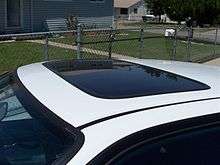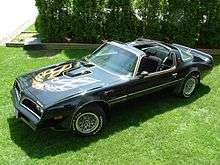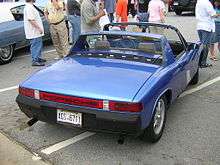Sunroof
An automotive sunroof is a fixed or operable (venting or sliding) opening in an automobile roof which allows light and/or fresh air to enter the passenger compartment. Sunroofs are either manually operated or motor driven, and are available in many shapes, sizes and styles.
.jpg)

History
Sunroofs, by historical definition are opaque. The first car company to offer a sunroof as a standard option was the Nash Motor Company as an option on some of its 1937 models.[1] Today, most factory sliding sunroof options feature a glass panel and are sometimes marketed as moonroofs, a term introduced in 1973 by John Atkinson, a marketing manager at Ford for the Lincoln Continental Mark IV. For the first year, Ford sent out its Mark IVs to American Sunroof Company for offline installation.
Variations of both the sunroof and moonroof have become the norm in both factory installed and aftermarket offerings, creating a wide range of features and choices.
Sunroof systems may be manual or electric, while most moonroof systems are electric/electronic. Manual sunroofs may be lever actuated, as in venting type pop-ups, manual lever or crank operated for sliding systems. Electric roof systems are usually cable driven by a motor and feature some form of sliding opening. Most moonroof systems today are electric and have either a combination pop-up/inbuilt or a pop-up/spoiler configuration (see sunroof types below).
Roof systems may be original equipment, factory options (provided by the car company), or installed aftermarket by a roof installation professional for the car dealer or retail customer. Once the vehicle leaves the assembly line, the factory option can no longer be integrated into the roof, making aftermarket the only option.
Sunroof types
Roof systems are available in many shapes, sizes and styles, and are known by many names. The generally accepted sunroof/moonroof industry terms are as follows:
- Pop-up sunroofs are simply a manually operated tilting panel. These panels are usually removable, and like T-roofs, must be stored when removed. The tilting action provides a vent in the roof, or a full opening when the panel is removed. Pop-ups can be installed in most vehicles, and are relatively inexpensive. Examples include metal panels in Porsche 944, early Mazda RX-7 and many glass panel factory and aftermarket installations.
- Spoiler sunroofs (tilt-&-slides) combine the features of a pop-up with those of a sliding roof system. They tilt to vent and slide open above the roof, requiring little headroom or roof length. Spoilers typically do not provide as large an opening as other roof systems, but offer the convenience of a self-storing panel. Most spoiler roofs are electric, with optional features like integrated sun shades and express open/close. Spoilers are ideal for short-roof vehicles where other types of sliders can't be installed. Examples include Honda CRX, Toyota Celica and the Mazda RX-7.
- Inbuilt sunroof systems have a panel which slides between the metal roof and interior headliner, requiring some loss of headroom but providing a full opening in the roof. All inbuilts slide inside the roof, while some also include a rear venting feature (see pop-up), and/or express open/close functions. Inbuilts don't fit every vehicle, as the panel must slide and store completely within the vehicle roof. Historically, inbuilts were a metal sunroof panel painted to match the vehicle roof, but now most are glass-panel systems with sliding sunshades (typically referred to as moonroofs). One of the first examples was the 1960 Ford Thunderbird.
- Folding sunroofs (often called rag-tops or cabrio coach) are a European tradition. They offer the convenience of a sunroof, with an opening more like a convertible. The panel is made of fabric (often vinyl), which folds back as it slides open. After a long absence in European and North American Markets, folding sunroofs have experienced a resurgence with several new factory-installed options. Aftermarket versions were once only manual, but now are also available in powered versions. Examples include the original VW Beetle, Renault Twingo and Jeep Liberty.
- Top-mount sliding sunroofs (rail mount topslider) have been a popular factory option in Europe for many years. A large glass panel slides open in tracks on top of the roof, with no loss of headroom. Most feature an integral wind deflector to eliminate wind noise. Examples include Donmar's original Skyroof topslider (aftermarket system), the London Taxi and Renault 5 cars.
- Panoramic roof systems are a new type of large or multi-panel moonroof which offer openings above both the front and rear seats and may be operable or fixed glass panels. Large operable openings are often accomplished with top-slider (tracks in the top of the roof) or spoiler type mechanisms. Examples include the Acura ZDX, Lexus ES, BMW Mini, Scion tC, Pontiac G6, Mercedes C Class, Volkswagen Eos, Porsche Cayenne, and the Tesla Model S.
- Removable roof panels (t-tops or targa roofs) open a vehicle roof to the side windows, providing a wider opening than other roof systems. T-roofs have two removable panels and leave a T-shaped structural brace in the roof center. Targa roofs include only one (opaque or transparent) panel and leave no cross brace. Aftermarket kits are no longer made, but several companies sell replacement and remanufactured panels, parts and accessories. Examples include Toyota Supra, Pontiac Firebird, Chevrolet Corvette, Honda NSX, and Porsche 914.
- Solar sunroofs are made of glass, with an inlaid photovoltaic solar panel that makes the glass totally opaque. They operate the same as conventional factory-fitted glass moonroofs (tilting and retracting), but when closed the solar panel provides electricity to power the interior ventilation fans, for cooling the car interior on hot days when the car is standing outside in the sunlight. These are available as a factory option on the 2010 Prius, recent Audi cars, Renault Zoé, and also were available on some versions of the Mazda Millennia and Mazda 929.
- Electric vs. Electronic Motorized power roof systems may be operated by a simple push-and-hold switch, or may include an electronic control module (ECM) to provide single-touch express opening, express closing and/or auto-closing on ignition off.
- Moonroof is just a sultry term for a glass sunroof that lets light in while closed. Examples include Acura ILX, and Pontiac G6.
 Aftermarket Pop-up (Sunmate Pop-Up)
Aftermarket Pop-up (Sunmate Pop-Up) Aftermarket Spoiler (Skyroof LSS Spoiler)
Aftermarket Spoiler (Skyroof LSS Spoiler) Folding Sunroof on a Volkswagen Beetle
Folding Sunroof on a Volkswagen Beetle Inbuilt (Moonroof) in Chevy Blazer
Inbuilt (Moonroof) in Chevy Blazer Aftermarket Top-mount slider (Skyroof II Topslider)
Aftermarket Top-mount slider (Skyroof II Topslider) T-Tops in Pontiac TransAm
T-Tops in Pontiac TransAm Targa Top in Porsche 914
Targa Top in Porsche 914- The panoramic roof of a Pontiac G6
References
- ↑ "Sliding Roof on Automobile Admits Sunlight to Interior" ''Popular Mechanics'', July 1937. Books.google.com. Retrieved 2011-11-26.